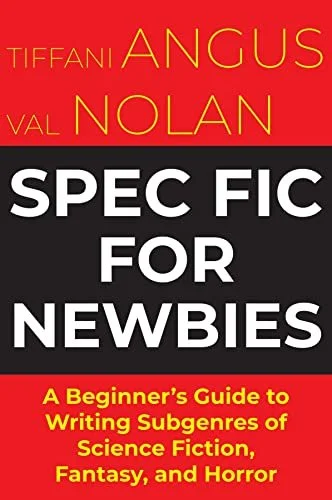Spec Fic for Newbies by Tiffani Angus and Val Nolan
Publisher – Luna Press Publishing
Published – Out Now
Price – £16.99 paperback £5.59 Kindle eBook
Tiffani Angus (Ph.D.) and Val Nolan (Ph.D.) met at the 2009 Clarion Writers' Workshop in California and since then have collaborated many times as fans and scholars on panels for SFF conventions and writing retreats.
Working together on this book and combining their experience as SFF writers and as university lecturers in Creative Writing and Literature made perfect sense!
Every year they see new students who want to write SFF/Horror but have never tried the genres, have tried but found themselves floundering, or, worse, have been discouraged by those who tell them Science Fiction, Fantasy, and Horror are somehow not "real" literature.
This book is for all those future Science Fiction, Fantasy, and Horror writers. Tiffani and Val are approaching these three exciting fields by breaking them down into bite-sized subgenres with a fun, open, and contemporary approach.
Each chapter contains 10 subgenres or tropes, with a quick and nerdy history of each derived from classroom teaching practices, along with a list of potential pitfalls, a description of why it's fun to write in these subgenres, as well as activities for new writers to try out and to get them started!
Spend a little time at a convention or author event and at some point, you’ll hear genre discussions. Is this x or y? Does it matter what it is called (if it is still prominently displayed in a bookshop)? Have authors transcended it (insert vomit gif of your choice!) The difficulty it creates is when someone asks can you recommend a good science fiction, fantasy or horror novel for someone new. Recommending Wheel of Time may not work for someone who would be more at home with the contemporary end of the spectrum say The City We Became by N K Jemisin; Science Fiction can be the space opera of The Expanse or the exploration of climate change via The Coral Bones by EJ Swift.
Genres are huge. I love them all and their many sub-genres as you Gentle Reader may have noticed. For a new reader, writer or blogger trying to understand these sub-genres and which books can fit where. How they work, evolve and in many ways are all in dialogue with one another is explored in the very useful Spec Fic for Newbies: A Beginner’s Guide to Writing Sub-genres of Science Fiction, Fantasy and Horror by Taffani Angus and Val Nolan. Which while I have no desire to ever write fiction, I found a very helpful guide to navigating the genre and of course filled with some good ideas and temptations.
This book has a straightforward approach. It breaks up the speculative world into SF, Fantasy and Horror and then the authors have highlighted core sub-genres within each one. There is a potted history of the term, how it first appeared and pleasingly for me they don’t stop in golden age of fiction territory. It is always a good sign when books up to the recent past are covered and a multitude of different author voices are mentioned. Then the authors try to flag in the spotter’s guide section the distinguishing features of a subgenre and give examples in books, tv and film. Why is this subgenre cool to play with and then with the key focus for the book being for writers some questions for writers to ask themselves. What choices can mean for their story – is your ship old or new, your crew military or roguish. There are oms writing exercises too which I’m not able to comment on very much but the sounded useful exercises as to how to design a story and avoid certain pitfalls. The style is light, witty and enthusiastic and its pacy. This is a book you can explore your favourite genres in but also dip your toes into other areas as well. It’s also useful to remember playing with genre, subverting it and arguing it does need you to still be aware of the genre’s characteristics and failings so this book is helpful – especially if you’re a literary fiction author not aware that time travel or parallel worlds are not new (to say but two infamous examples I can think of!)
I think understandably new authors to speculative fiction would benefit the most from this. This is not a book saying there is one style that rules them all its for ideas and shows the depth and history of the genre. If you were a newish blogger or reader and wanted to sample what the genre has to offer and understand certain themes you’ll see bandied around in reviews, online discourse or conventions then I think it would be helpful too. Even I a less than newbie reader or blogger found some good suggestions for new books and takes on the genre but I was also very impressed by what was being covered and suggested. A treat of a speculative fiction reference book with a useful breezy style to entertain. Definitely worth a look!
